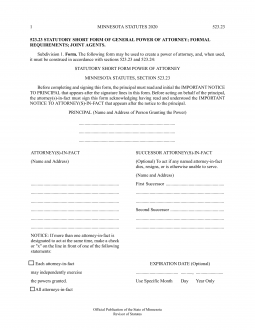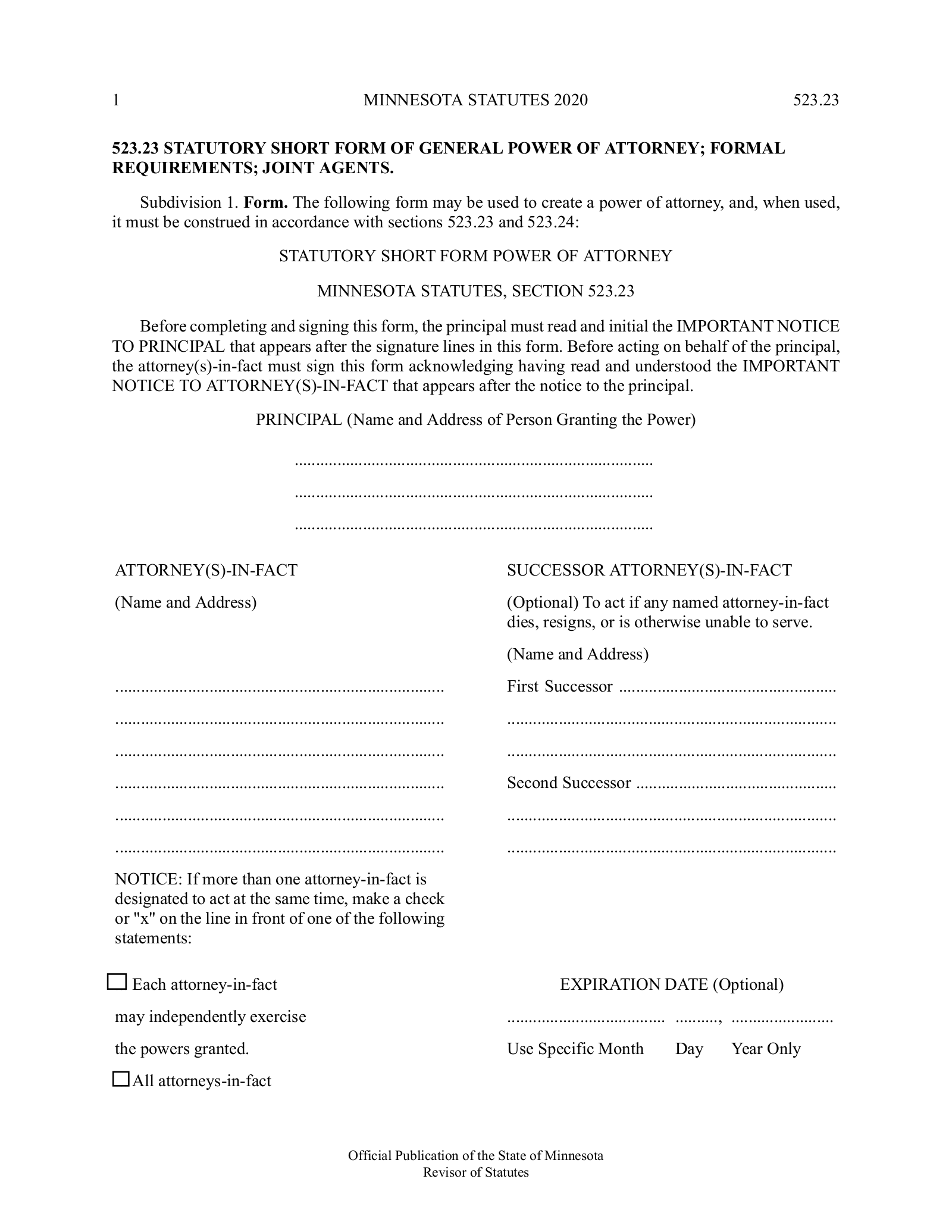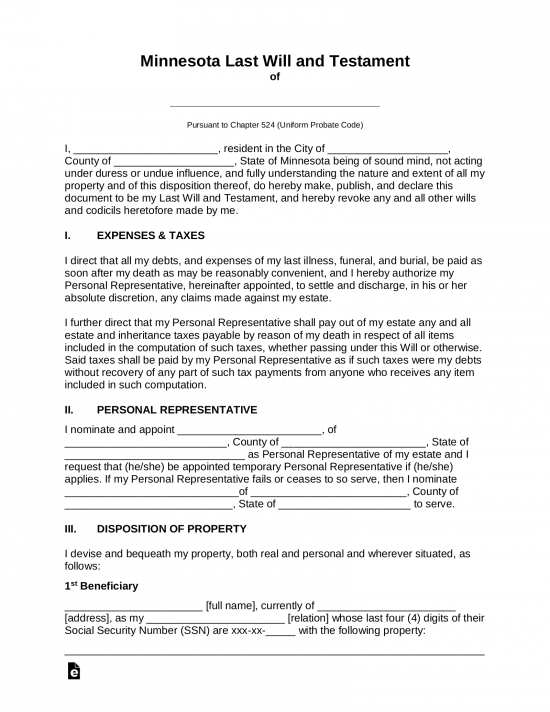Updated August 11, 2023
A Minnesota durable statutory power of attorney form lets a person (“principal”) appoint someone else to handle their finances. The person selected, the “agent”, will have unrestricted power to make any type of decision as if the principal was making it themselves. The term “durable” refers to the form being valid for use even if the principal becomes incapacitated or no longer able to make conscious decisions for themselves.
Versions (5)
Download: PDF
Download: PDF
Download: PDF
 Spanish (Español) Durable Financial Power of Attorney
Spanish (Español) Durable Financial Power of Attorney
Download: PDF
 Wright County Durable Financial Power of Attorney
Wright County Durable Financial Power of Attorney
Download: PDF
Table of Contents |
Laws
Chapter 523 (Powers of Attorney)
Definition of “Durable”
A power of attorney is durable if it contains language such as “This power of attorney shall not be affected by incapacity or incompetence of the principal” or “This power of attorney shall become effective upon the incapacity or incompetence of the principal,” or similar words showing the intent of the principal that the authority conferred is exercisable notwithstanding the principal’s later incapacity or incompetence (523.07).
Definition of “Power of Attorney”
The Minnesota Statutes do not define “power of attorney” other than to say that the term only applies to those that are validly executed, as explained in the signing requirements (523.03.3).
Signing Requirements
The principal is required to authorize in the presence of a notary public. The agent is required to sign but their signature does not have to be acknowledged (§ 523.01).
Statutory Form
The Minnesota legislature has created a statutory form for a power of attorney available at § 523.23.
How to Write
Download: PDF
Minnesota Principal
(1) Principal Name And Address. As the Principal issuing power of attorney in the State of Minnesota, you must make sure that anyone reviewing this paperwork is able to identify it as your declaration regarding your principal authority. Your name as well as your address must be recorded at the start of this document where it is requested. It is strongly advised that you list the same address used on your financial documents and government identification.

Principal’s Attorney-in-Fact
(2) Minnesota Attorney-in-Fact Name And Address. Every Attorney-in-Fact that you intend to grant the power or authority you hold over one or more subjects must be identified. This requires a listing of the full name and entire address of the Attorney-in-Fact that should wield your principal power in the State of Minnesota to be listed. It is strongly recommended when granting principal power to more than one Attorney-in-Fact that each one is able to cooperate with the other to carry out your directives.
(3) First Successor Agent. A person should be set in place in case the Attorney-in-Fact or one of the Attorneys-in-Fact cannot or refuses to continue this role. When this happens at a sensitive time, then long-term effects can be had on your finances. To offset such results, a separate individual can be placed in the role of First Successor Agent. This Party will not have any authority over your affairs unless the Attorney-in-Fact named ceases this role, is revoked, or is unable to act with principal authority. When this happens, the First Successor Agent will be offered the role of Attorney-in-Fact through this document which will also grant him or her the same principal authority held by the Attorney-in-Fact he or she is replacing. This is only possible if you declare the identity of the First Successor Agent and provide his or her contact information (address).
(4) Second Successor Agent. Another Successor Agent can be named in case more than one Attorney-in-Fact is revoked from this role or is otherwise unable to fill this role or if both the Attorney-in-Fact and First Successor Agent will not be able to act in your name with principal authority.

Optional Attorney-in-Fact Discussion
(5) Attorney-in-Fact Team. If more than one Attorney-in-Fact will be granted principal authority over your affairs in the State of Minnesota, then some documentation as to how they should interact when carrying out your directive should be provided. To this end, one of two statements should be initialed to indicate whether each may operate independently or if every principal action carried out by the Attorneys-in-Fact must be unanimously agreed to beforehand.
(6) Predetermined Termination Date. While there will be an opportunity to discuss the durability of this document, as the Principal, you retain the right to end these powers at any time and at your discretion through an issued revocation. This form will also allow a specific termination date to be set at will. If you wish the powers granted in this document to expire as of a certain date, then it must be listed as such.

First Section. Granting Power
(7) Real Property Transactions. This document will require your approval placed next to each paragraph containing a description of the power you wish granted for the Attorney-in-Fact’s use when carrying out principal directives. The first of these is lettered “A” and gives the Attorney-in-Fact the right to act in your name with real property transactions. You may limit his or her ability to one property as well as provide specific instructions or limitations to the real property transactions performed in your name by the Attorney-in-Fact. If you do not wish to grant this power or any rights to effect such transactions to the Attorney-in-Fact, then you should leave letter A unattended.
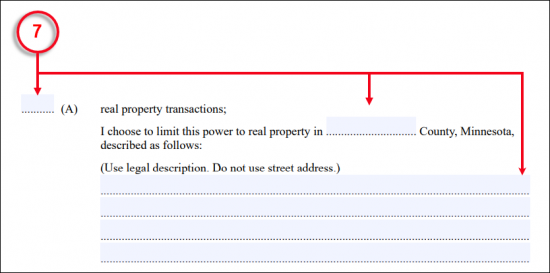
(8) Power Subjects Selection. The area containing the statements lettered B through M presents several financial areas in one’s business affair for your review. Review this list then initial each power that should be granted to the Minnesota Attorney(s)-in-Fact. It should be noted letters A through M are a list of powers that you may choose one or more items from however, you should not initial every item on this list if you wish to convey principal authority over all these subjects to the Attorney-in-Fact.

(9) Granting Every Power At Once. If you intend to have your Attorney(s)-in-Fact possess principal authority in all topics from this list, you do not need to initial each one. Instead, initial the final item (“N”) to grant all powers simultaneously to the Attorney-in-Fact.

Second Section. Durability
(10) Principal Incapacity. Your directive regarding whether this power appointment should remain effective when you have become incapacitated or otherwise unable to make decisions must be included. You may keep this document active regardless of your physical or mental health or have it immediately terminated upon such incapacitation by initialing the appropriate statement.

Third Section. Gifts
(11) Principal Power Over Gifts. The status of the Attorney-in-Fact’s ability to utilize your name to make or honor gifts must now be discussed. You may either refrain from supplying your initials to indicate that the Attorney-in-Fact does not have the right to make gifts to himself, herself, or anyone the Attorney-in-Fact supports or you may initial your approval to give the Attorney-in-Fact this power. If you have determined that he or she may have this authority, make sure to specify the name of the Attorney-in-Fact with this authorization.

Fourth Section. Accounting
(12) Principal Accounting Report. You have the option of insisting that an accounting of the Attorney-in-Fact’s use of principal power be tendered or you may waive this right. Either action requires your initials of approval however bear in mind that if you require an accounting by your Attorney-in-Fact then you must indicate if it should be submitted monthly, quarterly, or annually. If you have an Accountant or other similarly qualified professional in charge of the Attorney-in-Fact review, then report the full name and address.
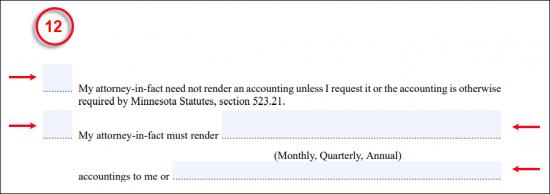
Fifth Section. Verified Principal Signing
(13) Signature Date. In order to grant the Attorney(s)-in-Fact with the above powers under the conditions you indicated, you must sign this document before a Notary Public. Furthermore, the date that you sign this document should be reported. Therefore, right before signing your name to execute this paperwork, report the current date.
(14) Principal Acknowledgement. Sign your name to this paperwork under the direction of the Minnesota Notary Public overseeing this action.
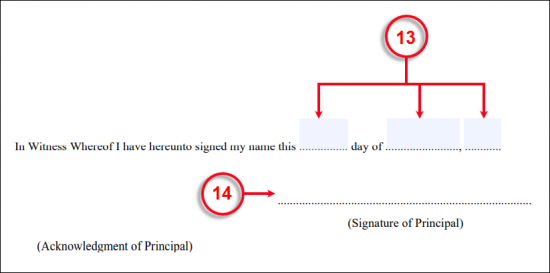
(15) Notarization. The Notary Public will complete the notarization area reserved for his or her authentication.
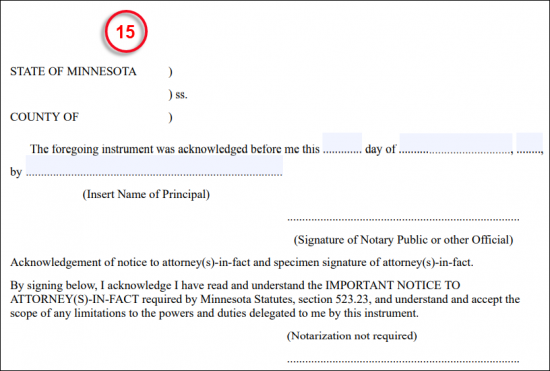
Information And Additional Signature Requirements
(16) Preparer. If anyone other than you has produced information to this paperwork (i.e., the preliminary information set in the introduction) then he or she must deliver his or her name and address to this paperwork.
(17) Attorney-in-Fact Acceptance. While not required, it is strongly recommended that the Attorney-in-Fact and Successor Agent provide a signature of acknowledgment to this document. This does not need to be notarized however, if possible, including the Agent signatures for the notarization is suggested.

Related Forms
Download: PDF, MS Word, OpenDocument
Download: PDF, MS Word, OpenDocument

